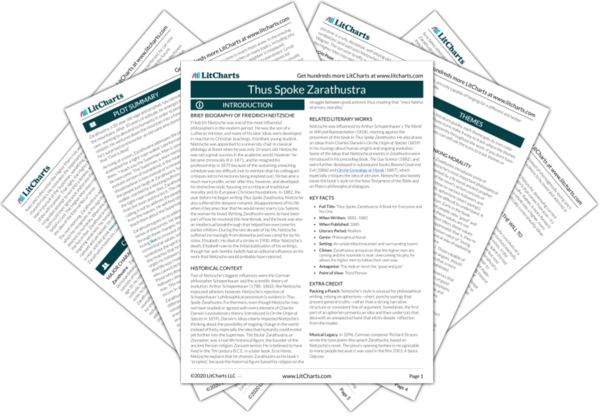The lion is Zarathustra’s symbol of a soul that embraces its freedom from society’s conventional values, retreating into the desert to fight against and ultimately destroy these so that new values are able to be created. At the end of the novel, the appearance of a lion at Zarathustra’s cave is the sign that it’s time for Zarathustra’s final descent to humanity. In this way, the lion is associated with the symbol of noontide—the time when humanity is ready to embrace its potential through the will to power and the coming of the Superman.
Lion Quotes in Thus Spoke Zarathustra
Free from the happiness of serfs, redeemed from gods and worship, fearless and fearful, great and solitary: that is how the will of the genuine man is.
The genuine men, the free spirits, have always dwelt in the desert, as the lords of the desert; but in the towns dwell the well-fed famous philosophers – the draught animals. For they always, as asses, pull—the people’s cart!
You are only bridges: may higher men than you step across upon you! […]
From your seed there may one day grow for me a genuine son and perfect heir: but that is far ahead. You yourselves are not those to whom my heritage and name belong. […]
It is for others that I wait here in these mountains and I will not lift my foot from here without them, for higher, stronger, more victorious, more joyful men, such as are square-built in body and soul: laughing lions must come!
‘Pity! Pity for the Higher Man!’ he cried out, and his countenance was transformed into brass. 'Very well! That—has had its time! […]
‘The lion has come, my children are near, Zarathustra has become ripe, my hour has come!
This is my morning, my day begins: rise up now, rise up, great noontide!’
Thus spoke Zarathustra and left his cave, glowing and strong, like a morning sun emerging from behind dark mountains.












